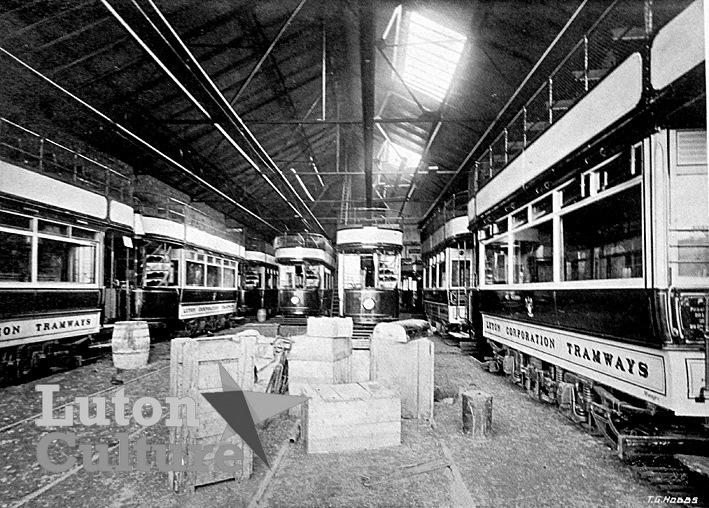Digest of stories from The Luton News: Thursday, August 8th, 1918.

There was another tramway strike in Luton on Sunday, but many people in the town were unaware of it. The strike was not of long duration, for the tramway management met the employees, and by 11.30 on the morning of Bank Holiday the system, was again in full going order.
From information given to our representative by one of the employees the chief trouble at that time appeared to be over the question of the bonus, which is dependent upon the rate of wages and the hours put in during the week. The employees asserted that the scheme worked unfairly i9n many cases and that they were unable to maintain sufficient wages to secure the necessary bonus.
The strike, as stated, commenced on Sunday morning, and all employees seem to have participated, including the girl conductors, who has a grievance of their own as to the amount of the bonus. A meeting was held, we believe in the Labour Club in Bute Street, when some forcible remarks were made, and subsequently a deputation laid the general position before Mr Wray, the manager.
As a result of the negotiations, a compromise was arrived at, and we understand that the rate of 6d per hour was requested, the amount of 5d was conceded (instead of the old rate of 4½d), with £1 per week bonus. The girls will receive 10 shillings bonus in addition to the hourly rate.
The compromise was evidently satisfactory, for the trams were again in evidence in time for the holiday business, and were crowded throughout the day on Bank Holiday. The strike throughout was exceedingly quiet, which is to the credit of its organisers.
Mr Wray, the manager, interviewed as to the employers' side of the question, declared: “The strike came as a very unpleasant surprise to me. We were complying absolutely with the awards of the Government Committee, and the employees gave me not the slightest indication of such a drastic step.
“There was no request, and the first thing I knew about the matter was the fact that the cars were not out. I told the leaders about it. We compromised, and have gone considerably over the award, which increase represents a very big sum in the aggregate. As against that we cannot raise fares.”
-
A remarkable escape whilst under shell fire in a dug-out was that of Pte Aubrey Cooper, of the Machine Gun Corps, elder son of Mr Archibald Cooper, the Superintendent of the Luton Baths. He has written home saying he and his friends in a machine gun team were in the dug-out when a shell dropped on them. They were all blown up, dug-out as well. One of his comrades was killed and two others were wounded, but he and his chum had a very narrow escape, although they were completely buried beneath the debris for half an hour before they were released. The wonderful side of it is that Pte Cooper, who had been gassed twice previously, seems to have escaped unhurt. been gassed twice previously but recovered. The old Modern School boy had gone into a London counting-house before joining the London Rifle Brigade in January 1917 at the age of 18. He was later transferred to the Machine Gun Corps and went to France in March 1918.
-
The marriage took place on Tuesday at Luton Parish Church between Miss Evelyn Reason, daughter of Mr George Reason, of 10 Park Road West, and Cpl Harold Curtis Driver (Middlesex Regiment), son of Mr William Driver, of the Greyhound pub, Park Street West/Langley Street. The Rev W. C. M. Winter officiated.
-
Recent statements in Parliament with reference to the importance of settling large numbers of soldiers and sailors on the land of this country at the end of the war and the important recommendations of the Selborne (Reconstruction) Report, lend special interest to a pamphlet published by the Central Land Association. Briefly, the Association proposes that landowners in the different counties should co-operate in providing facilities by which ex-servicemen can be enabled to obtain land near their own village on easy terms for occupation or purchase, and county committee are suggested to develop and carry out the scheme.
-
An old volume has been out on loan in Leagrave and has become quite popular. It is a Book of Physic, by that great Biblical scholar and traveller John Wesley, third edition. The first issue was published at Bristol in 1755 It contains a collection of simple remedies for common ailments, and is a most valuable compendium of information. That some of the prescriptions are now obsolete may be taken for granted, because many discoveries in medical science have become common knowledge since John Wesley's day. In addition to the numerous prescriptions there is an appendix which contains paragraphs on scientific experiments such as would be both amusing and instructive to groups of young people. Considering the time when this book was produced, it is a literary marvel.

